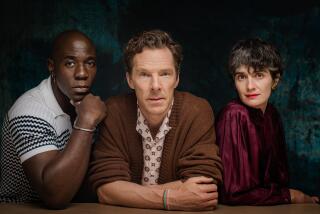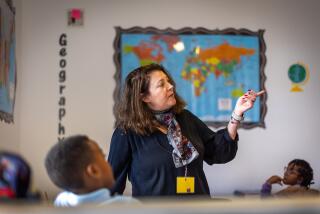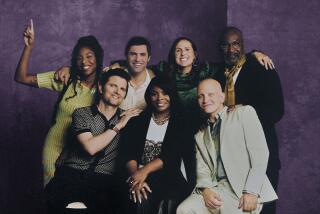How ‘Arthur’ grew up: Inside the beloved TV show’s emotional finale
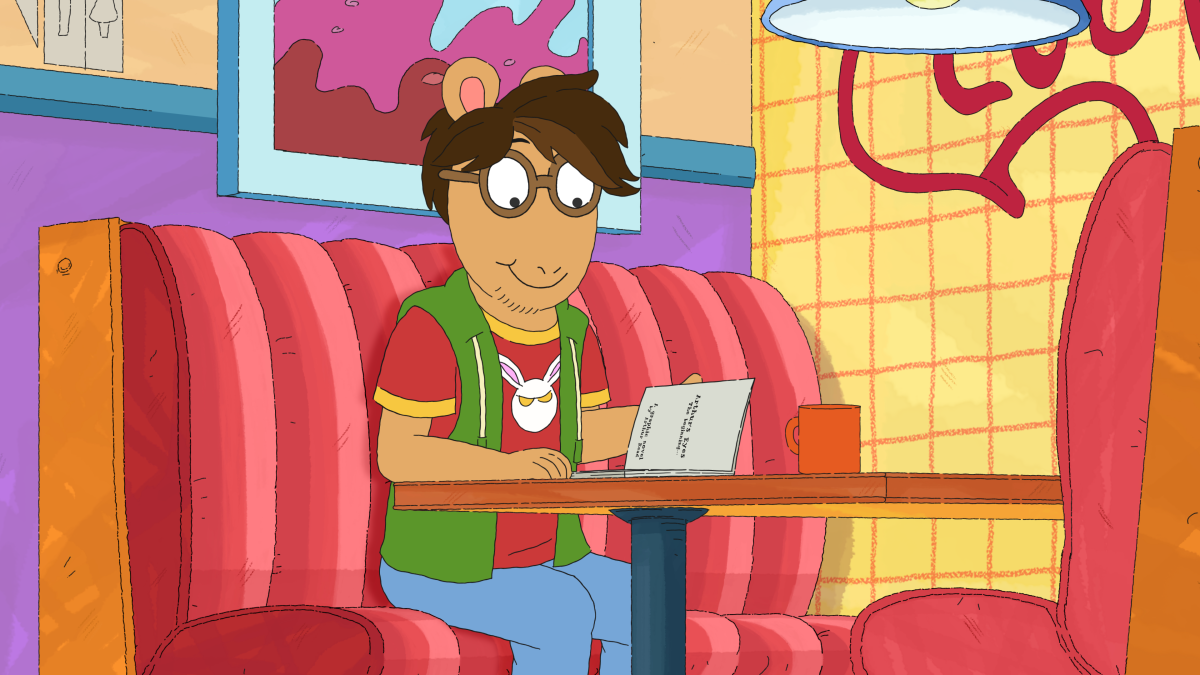
- Share via
Warning: The following contains spoilers for the series finale of “Arthur.”
Art imitated life as television’s most lovable aardvark celebrated his series’ finale.
After 25 seasons, 253 episodes and seven specials, the PBS mainstay “Arthur” aired its final episode, “All Grown Up,” on Monday.
Based on a series of books by Marc Brown, TV’s longest-running children’s animated program marked the momentous occasion by flashing forward 20 years into the future, giving viewers a glimpse of their beloved characters as adults. Arthur (now with facial hair!) has become a graphic novelist. His first book, “Arthur’s Eyes,” happens to be the title of the very first episode of “Arthur,” which premiered on Oct. 7, 1996.
The complete guide to home viewing
Get Screen Gab for everything about the TV shows and streaming movies everyone’s talking about.
You may occasionally receive promotional content from the Los Angeles Times.
“The idea occurred to me that this whole series has been something Arthur has created,” head writer Peter K. Hirsch says. “So the suggestion is this has all been his memoir. We thought, ‘Oh, that’s fun. It’s a little meta.’”
Nearly all the residents of Elwood City get a peek at their future. Arthur’s sister, D.W., is now a traffic cop. His best friend, Buster, is a schoolteacher. Francine runs a sneaker company. Muffy is running for mayor. Binky is an enthusiastic weatherman. And George now manages the Sugar Bowl.
“Kids are our boss, and we listen to them,” Brown, who also serves as co-executive producer on the series, says of the decision to show the grown-up versions of the characters. “And that is one of the most often asked questions we got: ‘What happens to Arthur? What happens to Francine?’ And so it seemed like a logical gift to give these loyal viewers something that they really wanted.”
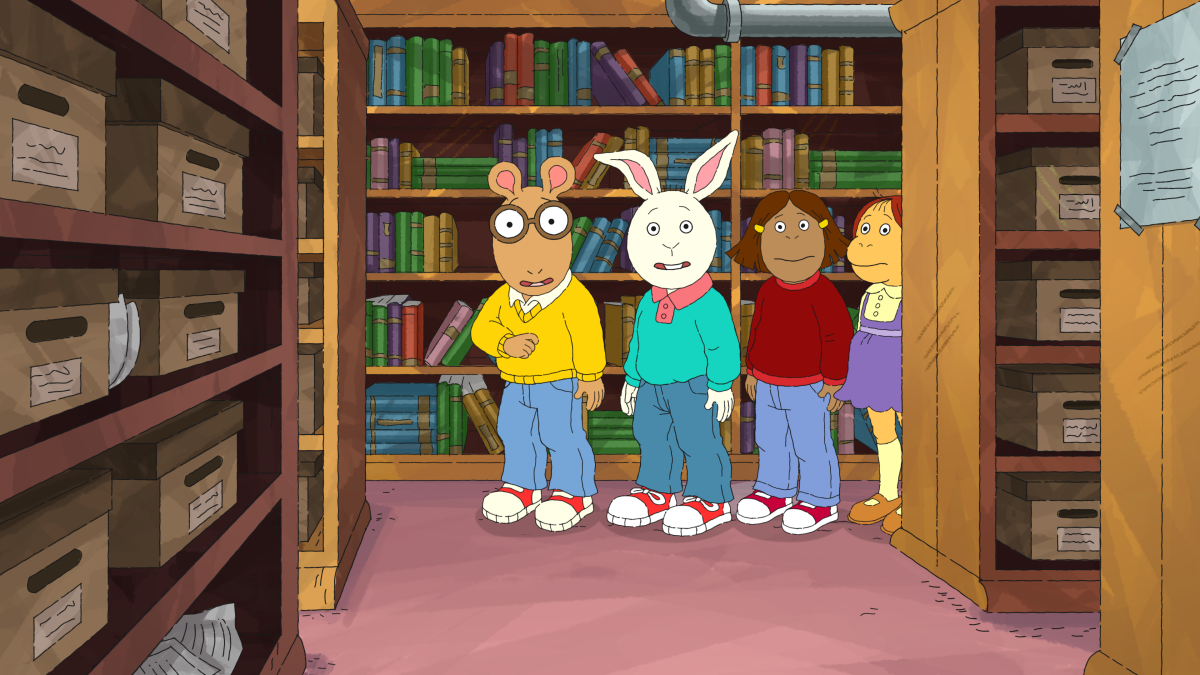
When coming up with the characters’ futures, Hirsch says they didn’t want to go with the most obvious choices — like having soccer-loving Francine become a professional player. Instead, Hirsch homed in on three core values of each character. “Peter could tap into their inner strengths and see where these special facets of their personalities might lead them as adults,” Brown says.
It also gives young viewers a chance to see that what makes them special might turn into their career. “Life addresses you most of the time,” Hirsch says. “It takes you on these different twists and curves, and then it’s up to you to see how it fits.”
The finale is also full of Easter eggs. When Arthur is checking out a book about how to draw animals, Buster remarks, “I never knew their noses were so long.” Brown’s first book, published in 1976, was entitled “Arthur’s Nose” — and that Arthur did, in fact, have an appropriately long nose. Muffy is running against a character named Mayor Hirsch who has been in office for years. Arthur meets a man in the library who encourages him to keep the book “Drawing Animals the Easy Way.” That kindly patron is voiced by none other than Brown himself. Michael Yarmush, who voiced Arthur when the show premiered (Arthur and D.W. are always voiced by child actors and have been recast throughout the seasons), returns to voice the adult Arthur.
Kathy Waugh, a creator of the beloved animated children’s series ‘Arthur,’ says PBS made a mistake by canceling it after 25 years.
Over the years, “Arthur” has tackled a wide range of topics. George befriended a character with autism in 2010’s “When Carl Met George.” Arthur himself became a bully in 2013’s “So Funny I Forgot to Laugh.” The school lunch lady is diagnosed with cancer in 2009’s “The Great MacGrady.”
“We really want to acknowledge that kids live in this world, and the world that they live in is sometimes wonderful and sometimes not so great, and that we can’t protect kids from the things that are going on around them,” executive producer Carol Greenwald says. “We have to give them tools and support to get them through it. The underlying philosophy [is], ‘We’ve got to really respect kids.’ So we are not writing kids programming; we are writing programming that kind of speaks to kids where they are and that is respectful of them but also understands that they like to laugh.”
The series’ tone is unique — honest but never patronizing to its young viewers. By the third season, Hirsch says, they realized they had done all the birthday party episodes, and it was time to focus on broader topics, turning the series into an age-appropriate version of “Friends.” “Whenever we would take new writers on, I would tell them not to write for a children’s show,” Hirsch explains. “You should write from your own experiences — things that would disturb, inspire or engage you — and then let’s figure out how to suit that for children. … Kicking and sex and cursing we shouldn’t do, but other than that, what can’t we touch?”
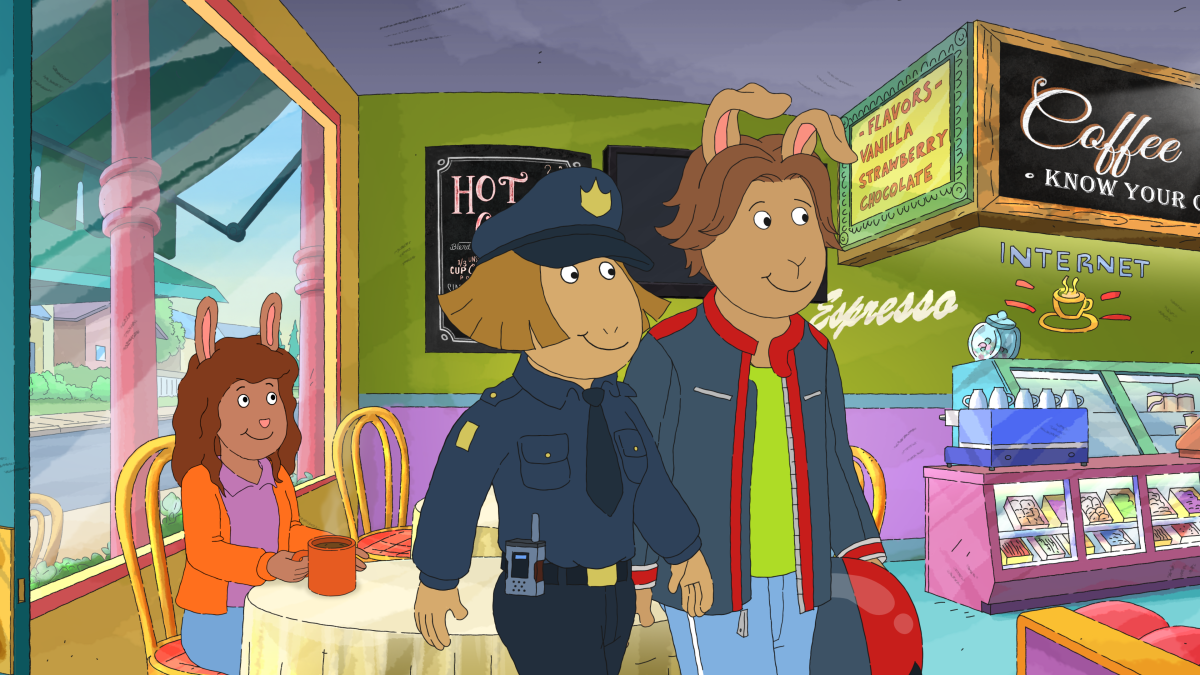
Along the way, life lessons about how to navigate the world were imparted. “My goal was always to show a character who screws up royally and then figures out a way to come back from it, and that kind of helps them to become a better person,” Greenwald says.
There have been groundbreaking moments. Teacher Mr. Ratburn married a chocolatier named Patrick (who makes a cameo in the series finale) in 2019. The episode focused on the students’ shock that their teacher has a life outside school and their concern that Mr. Ratburn marry someone who is kind. “Kids just want to see their teacher happy,” Brown says. “They love their teacher, and it doesn’t really matter who it is as long as he’s happy.”
Although these characters are animals who remained 8 years old for more than two decades, “Arthur” has always reflected the real world. “I don’t think it really changed its mandate over the years,” says Daniel Brochu, who has voiced Buster since the show’s inception. “The true spirit of the show has always been about inclusivity and acceptance and inviting difference. … It never lost what it was aiming to do. It had this kind of innocent, beautiful charm to it that never went away.”
In addition to Brochu, Hirsch and Greenwald, Jodie Resther, who voices Francine; Melissa Altro, who voices Muffy; and several other voice actors have been part of the series from the first episode. Brochu recalls that early in the show’s run, when he was in his 20s, he wanted to go travel and live in Australia. Instead of recasting him, the spinoff “Postcards From Buster” was born — and production actually traveled to Australia to record Brochu. “It was very easy to replace voices,” Brochu says. “That amount of loyalty blew my mind.”
There’s loyalty among fans as well. Google “Arthur memes,” and you’ll find a treasure trove of content from viewers who grew up with the series. Brown’s latest book, “Believe in Yourself: What We Learned From Arthur,” features the “Arthur” artwork fans have sent him over the years. “Each Arthur has all the same elements — the glasses, the ears, eyes, nose, mouth — but each one is completely unique,” he says.
Brochu recalls being on a movie set recently when cast members found out he was the voice of Buster. “I was like a childhood hero to them,” he says. “It’s kind of like being part of ‘Sesame Street.’ I have a great feeling of pride because you know that the product is just so useful and cool for kids.”
In a 2018 episode of PBS Kids’ series “Arthur,” civil rights leader John Lewis guest-starred as himself to encourage its aardvark protagonist to political action.
Brown says it’s bittersweet having the show come to a close. But he and Hirsch are already working on a new preschool series called “Hop.” “I love having new problems to solve and new projects to work on,” he says. “I always have too many things going on inside my head that I want to do.”
And although the show is ending, “Arthur” will pivot to new projects. A new series of shorts will allow Arthur and his friends to respond more quickly to what’s happening in the world (recent ones have addressed mask-wearing and racism). There also will be a podcast, which is still in its nascent stages. “We know that kids are consuming media in a different way, and we just want to be where they are,” Greenwald says.
Hirsch thinks there’s probably stuff out there they haven’t even hit upon yet, like an “Arthur” talk show. “Arthur would be a good talk-show host,” he says. “He’s very sympathetic, and he’s curious.”
Until then, there are 25 seasons of “Arthur” for a whole new generation of children to enjoy. “If it is a legacy,” Greenwald says, “hopefully it is a living one.”
More to Read
The complete guide to home viewing
Get Screen Gab for everything about the TV shows and streaming movies everyone’s talking about.
You may occasionally receive promotional content from the Los Angeles Times.
